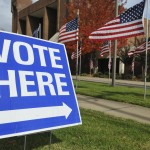CLEVELAND, OH — Dēmos and American Civil Liberties Union (ACLU) filed a brief with the U.S. Supreme Court detailing how Ohio is violating the National Voter Registration Act (NVRA) by targeting registered voters who fail to vote in a two-year period for eventual removal from the registration rolls — even if they have not moved and are still fully eligible to vote.
Targeting people for removal simply based on non-voting is a powerful tool of voter suppression. In 2015 alone, over 40,600 registrants in Ohio’s largest county, Cuyahoga, were purged from the rolls using this flawed process, and countless Ohioans have been denied their right to vote as a result of these unlawful purges. These purges are in direct violation of the National Voting Rights Act (NVRA)—that explicitly states that voters can be removed if and when they are ineligible to vote—not voting often enough does not make a person ineligible.
Freda Levenson, legal director of the ACLU of Ohio said, “The purging of eligible voters has not increased the accuracy of voter rolls or done anything to further the integrity of elections. Quite to the contrary: the purge systematically disenfranchises perfectly eligible Ohioans for merely exercising their right not to vote. The Sixth Circuit Court of Appeals declared that such purges violate the National Voter Registration Act. And the Supreme Court, we hope, will confirm this. At a time when the nation’s faith in our democratic process is at an all-time low, this case represents an opportunity to right the wrong of Ohio’s voter purges, and take a significant step toward fair and just elections.”
“Voting should be free, fair and accessible, so that all eligible people can have their voices heard. Our democracy — and our federal laws — do not tolerate singling out voters who miss an election and cancelling their registrations. States have many lawful ways to keep their rolls up to date without using practices that deny thousands of eligible people the right to vote,” said Brenda Wright, Vice President, Policy & Legal Strategies at Dēmos.
The widespread disenfranchisement caused by Ohio’s purge process spurred the Ohio A. Philip Randolph Institute (APRI), the Northeast Ohio Coalition for the Homeless (NEOCH), and Ohio resident Larry Harmon to challenge the practice in federal court. A federal appeals court ruled against Ohio, finding that Ohio’s purge practice violated the NVRA’s prohibition on removing registrants from the rolls for not voting. The state appealed the decision to the U.S. Supreme Court, which will hear arguments in this case, Husted v. Ohio A. Philip Randolph Institute, on November 8.
“Ohio’s practice of purging infrequent voters hits individuals who are already marginalized the hardest,” said Andre Washington, President of the Ohio A. Philip Randolph Institute. “People of color, hourly and wage workers, and low-income individuals frequently encounter barriers that prevent them to getting to the polls. As seen in 2015, a disproportionate number of the voters purged from Cuyahoga County’s rolls came from low-income neighborhoods and communities of color.”
The NVRA, passed in 1993 to increase participation in the electoral process, requires states to maintain accurate and up-to-date voter rolls, while also protecting voters from improper removal. The law allows states to remove a voter’s name from the rolls only if the voter has become ineligible and if the state uses safeguards to ensure that voters are not erroneously purged; it specifically prohibits states from removing voters for not voting.
“Eligible voters have the right to choose when, how, and how often to vote. They shouldn’t be disenfranchised for exercising that right,” said Dale Ho, director of the ACLU’s Voting Rights Project.
As we have seen time and time again, homeless voters and other marginalized voters have to fight to make their voices heard in the electoral process,” said Chris Knestrick, Executive Director at NEOCH. ““NEOCH works hard to bring these voters into the electoral process, but unfortunately, the state of Ohio’s practice of purging registrants for their failure to vote locks the doors to the ballot box for many of these voters, which we believe is in violation of federal law and jeopardizes our democratic process.”
Across the state of Ohio, individuals who have been unlawfully purged from the voter rolls have shared a common experience: they turn up to the polls only to learn at that moment that their names had been stricken from the rolls and that they were being denied their right to vote. More than 7,500 voters were spared this fate last November as a result of the ruling from the court of appeals.
###
Stay Informed
Sign up to be the first to hear about how to take action.
By completing this form, I agree to receive occasional emails per the terms of the ACLU’s privacy statement.
By completing this form, I agree to receive occasional emails per the terms of the ACLU’s privacy statement.

